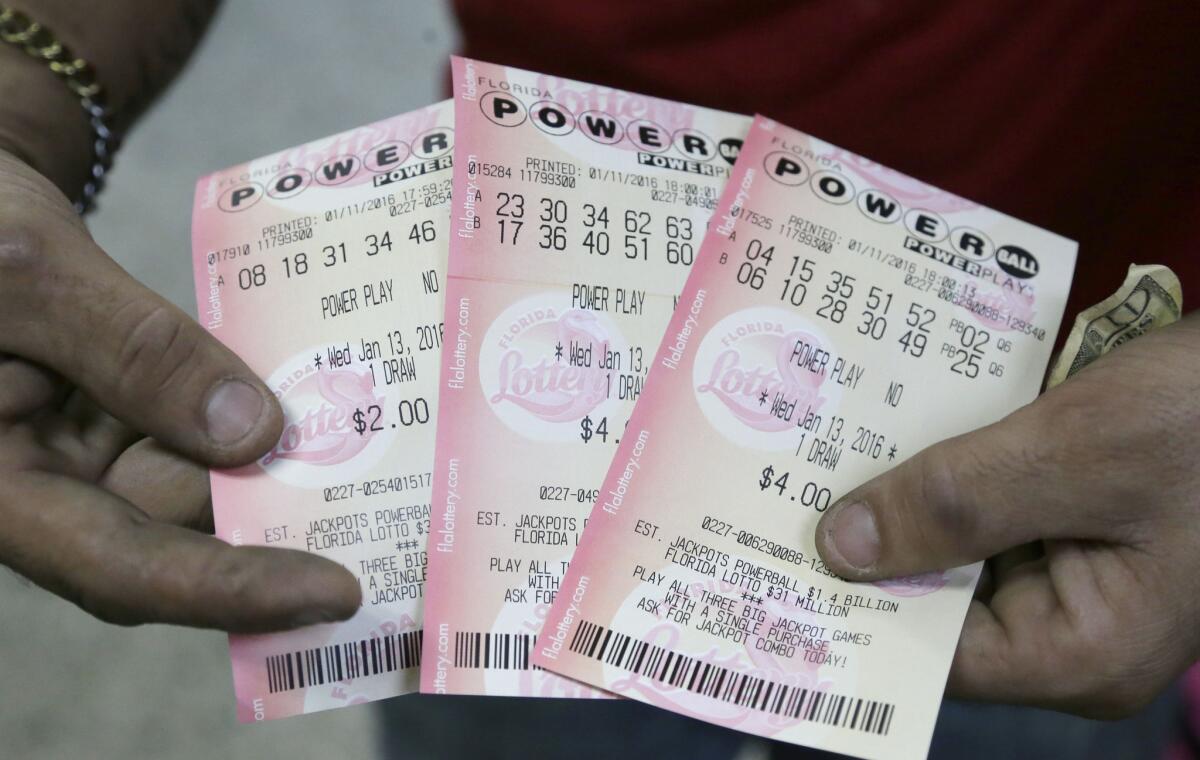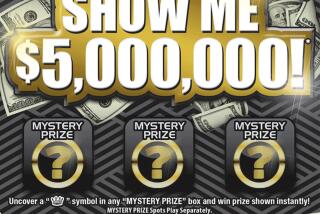Opinion: How a mathematician plays Powerball

A customer shows his purchased Powerball tickets at a grocery store in Hialeah, Fla., on Jan. 11.
- Share via
Imagine a stack of one dollar bills reaching from Los Angeles to Tijuana with exactly one $1,000 bill in the stack. The odds of any single ticket winning the lottery tonight are smaller than finding that $1,000 bill on your first try. In fact, the odds are significantly worse. Alternatively, suppose you have a 613-mile-high tower of poker chips, only one of which has a gold star on it. Again, your chances of winning the lottery are worse than picking that chip out of the stack.
On the other hand, don’t be surprised if you wake up Thursday to find out that the $1.5-billion Powerball prize is being split between four tickets. If only 600 million tickets are sold, there is a 15% chance that the prize will be split at least four ways. Of course, even $350 million is a lot of money, so I doubt that the winners would mind too much.
A two hour movie costs $20, so a $2 lottery ticket only really needs to entertain you for about 12 minutes to have the same value.
But what if you bought a ticket for every single number combination? If you could guarantee that no one else had a winning ticket, then you would get the $800-million immediate payout and make about $200 million. Sadly, though, because you would most likely have to split the winnings, you’re still likely to end up $250 million in the red.
For the most part, there is never a case where the lottery is a good investment strategy. Is it ever? From 2004 to 2011, the Massachusetts state lottery’s WinFall game was a good deal every three months or so. Some enterprising MIT students spotted the loophole in the system and made millions of dollars buying enough tickets to guarantee a 15% to 20% return on the investment. This, however, was due to a flaw in the system where whenever the jackpot became large enough, it was rolled down to smaller prizes. This would be similar to the Powerball suddenly multiplying the payout on matching four plus the power ball 40 times.
So is it worth it to buy a ticket? As a mathematician, I’m expected to say no, but really, it depends on why you want to play. If you are expecting to win, don’t buy a ticket. If you are buying tickets as an investment strategy, then you are making a big mistake. If you are buying a ticket to fantasize for a short while about having $1.5 billion, that is a different matter. A two hour movie costs $20, so a $2 lottery ticket only really needs to entertain you for about 12 minutes to have the same value.
We also play the lottery to be part of a community. Whether by having the chance to simply talk with each other about what we will do with our winnings or by joining a ticket pool, we use our $2 to belong to a group. Much like rooting for the Dodgers or playing on a softball team, the lottery allows us to come together.
The expected value, or the amount that we would win on average, is only one way of valuing a lottery ticket or an investment strategy. Suppose you need a particular annual retirement income to keep your house. You would likely choose a less risky investment that guaranteed your ability to stay in your home, even though it might have a smaller return. Alternatively, if you desperately need $100 and only have $60, you might pay $60 for a fifty-fifty chance at winning $100. This is essentially what Katniss does when she pays for food for her family (tessera in the book) by increasing her odds of being chosen for the Hunger Games.
The lottery works in a similar (but opposite) way for most of us. Our overall income and happiness change little when we lose $2. Thus, while the average value of playing the lottery is negative, we treat the cost as effectively nothing. The fantasy $1.5 billion is so large, we perceive it as solving all of our needs, and thus we often value it more than the actual dollar figure. And we have the fun of imagining what we will do with our winnings. Speaking of which, tomorrow, I’m heading to the Caribbean.
Curtis Bennett is a mathematics professor at Loyola Marymount University. He won the Mathematical Assn. of America’s Haimo Prize for outstanding teaching in 2010.
Follow the Opinion section on Twitter @latimesopinion and Facebook
More to Read
A cure for the common opinion
Get thought-provoking perspectives with our weekly newsletter.
You may occasionally receive promotional content from the Los Angeles Times.









